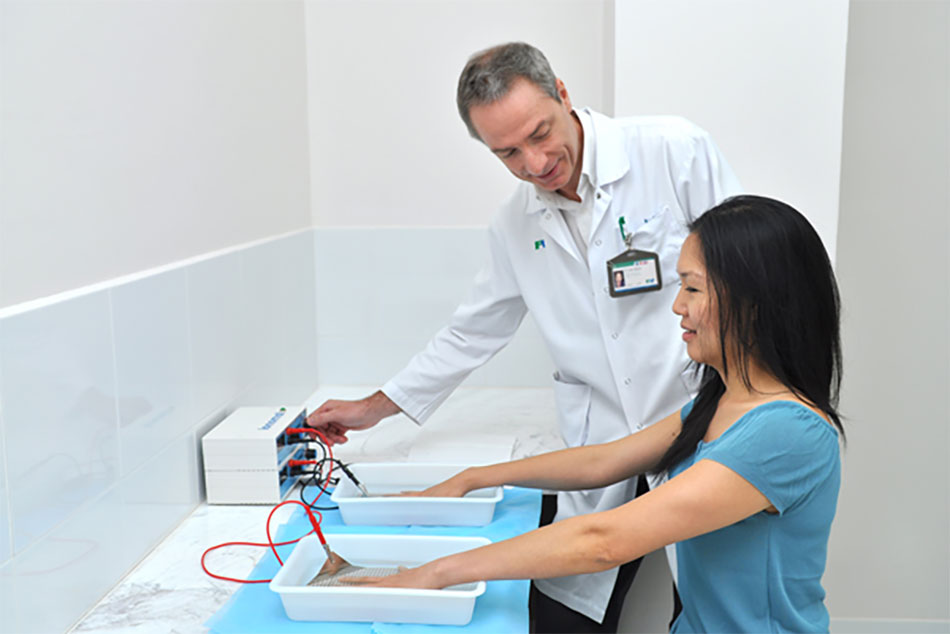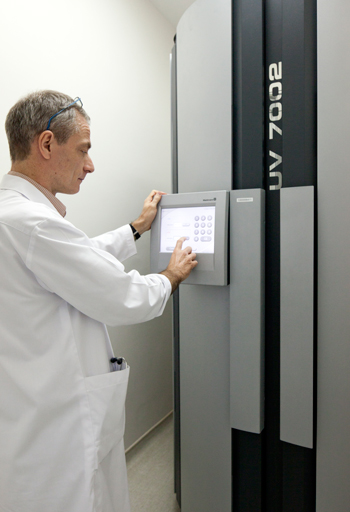FV’s Head of Dermatology Dr Guillaume Orieux has 35 years of experience working in dermatology at highly respected clinics and hospitals in France and the UK, and has successfully treated many patients with skin issues in Vietnam. He regularly treats cases of psoriasis, a disease which isn’t dangerous or infectious, but causes itchy red scales which can make many patients feel insecure about their appearance, especially is they haven’t consulted a care provider or sought treatment for a long time.

Dr Guillaume Orieux, Head of the Dermatology Department, FV Hospital
Psoriasis is often poorly understood in the community
During his time working at FV, Dr Guillaume Orieux has treated tens of thousands of patients in Vietnam for more than 300 different skin diseases. Psoriasis is a disease Dr Guillaume sees regularly, but few patients understand it fully and don’t know how to best manage their symptoms.
Psoriasis manifests as red skin lesions with silvery white scales, typically localised in areas like the scalp, fingers, hands, feet, knees, elbows, buttocks, and legs, but can be present throughout the body. The scales can cause discomfort for patients and make them feel self-conscious, which can lead to social isolation and depression. It is important that patients with psoriasis seek adequate care so that they can enjoy a better quality of life.
“Psoriasis is an inflammatory response of the skin, and the goal of treatment is to reduce the activity of that inflammatory response,” explains Dr Guillaume.
Dr Guillaume has witnessed the despair of patients who have visited myriad hospitals and clinics, hoping to be cured completely but are always disappointed. The first thing Dr Guillaume explains when meeting patients for the first time is that this is a chronic disease with no cure—the disease will recur after a while if not treated, monitored and controlled. The search for a radical cure is costly and even dangerous if patients are treated with high doses of cortisol, which can relieve symptoms in the short term but actually makes the disease worse when the lesions return. The treatment of psoriasis with traditional medicines is also quite common, yet this can also dangerous if the medicine contains hidden arsenic and cortisol.

Dr Guillaume Orieux treats psoriasis with phototherapy
At FV Hospital, patients with psoriasis are treated based on the severity of their skin lesions. If the lesions are small, the patient only needs to use cream. If the lesions are all over the body, phototherapy via UV light, oral medications or targeted therapy will be used.
Targeted therapy – a step forward in the treatment of psoriasis
In targeted therapy, injections of biological medication are administered which work at the cellular level to help control the disease without causing flare ups. Patients will receive their injections according to a personalised regimen which will be reduced over time, depending on their individual condition and response to treatment.
“Previously, oral immunotherapy was the typical care methodology, which suppresses the patient’s immune system response to reduce the activity of the skin’s reactivity throughout the body. Targeted therapy means that biological treatment is provided which only minimises the immune system response in localised areas,” explains Dr Guillaume. When receiving targeted therapy, patients do not need to drink or apply medication as often.
However, targeted therapy method is more expensive than other protocols and requires long-term maintenance. The doctor will space injections as far apart in time as possible to reduce the burden of cost on the patient. Dr Guillaume also notes that patients should be tested for sensitivity before deciding to take the medication and periodically monitored during use.
FV’s Dermatology Department receives many patients with severe psoriasis who are experiencing fever, pain, and extreme discomfort because they have developed plaques all over the body, or present with lesions that have become pustules. After a course of treatment at FV Hospital, patients are always very happy to have clear skin. Dr Guillaume says it is now very common that patients are cured of all psoriasis symptoms during a course of treatment, but cautions that because the disease can recur at any time, it is important for patients to adapt to living with psoriasis.

FV Hospital’s Dermatology Department is fully equipped with modern machines to diagnose and treat all skin conditions.
As a multi-specialty hospital, FV’s treatment protocols can involve doctors from different specialties. When patients visit the Dermatology Department and other health problems are discovered, doctors here will consult with other departments to coordinate more effective treatment.
To make an appointment with Dr Orieux Guillaume, please call (028) 54 11 33 33.



